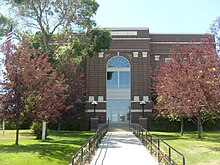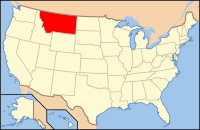Judith Basin
| Judith Basin County, Montana | |
|---|---|

Judith Basin County Courthouse in Stanford
|
|
 Location in the U.S. state of Montana |
|
 Montana's location in the U.S. |
|
| Founded | December 10, 1920 |
| Seat | Stanford |
| Largest town | Stanford |
| Area | |
| • Total | 1,871 sq mi (4,846 km2) |
| • Land | 1,870 sq mi (4,843 km2) |
| • Water | 0.8 sq mi (2 km2), 0.04% |
| Population (est.) | |
| • (2015) | 1,926 |
| Congressional district | At-large |
| Time zone | Mountain: UTC−7/−6 |
| Website | www |
Judith Basin County is a county in the U.S. state of Montana. As of the 2010 census, the population was 2,072. Its county seat is Stanford, Montana.
Judith Basin County was formed from western Fergus County, Montana and eastern Cascade County, Montana on December 10, 1920. In 1895, Yogo sapphires were discovered at Yogo Gulch, about 15 miles southwest of Utica, which at the time was in Fergus County.
According to the U.S. Census Bureau, the county has a total area of 1,871 square miles (4,850 km2), of which 1,870 square miles (4,800 km2) is land and 0.8 square miles (2.1 km2) (0.04%) is water.
This small county strongly leans Republican; a Democrat has not won this county since Lyndon Johnson's landslide in 1964.
As of the census of 2000, there were 2,329 people, 951 households, and 661 families residing in the county. The population density was <1/km² (1/sq mi). There were 1,325 housing units at an average density of <1/km² (1/sq mi). The racial makeup of the county was 98.63% White, 0.04% Black or African American, 0.34% Native American, 0.09% Asian, 0.04% from other races, and 0.86% from two or more races. 0.56% of the population were Hispanic or Latino of any race. 27.1% were of German, 11.3% Norwegian, 10.0% Irish, 9.8% English and 8.7% American ancestry. 92.0% spoke English and 7.5% German as their first language. Many of the German-speaking residents of Judith Basin County are Hutterites.
...
Wikipedia
